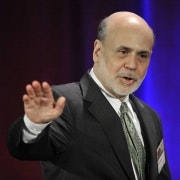Don't blame the Fed for emerging market woes
When in doubt, blame a central banker. For investors burnt by the decline in emerging market stocks, it is tempting to point the finger at US Federal Reserve chairman Ben Bernanke. Had the Fed chief refrained from laying out a timetable for the withdrawal of monetary stimulus, developing world equity markets would surely have avoided a pernicious sell-off (Pulling the cloak off emerging imbalances, August 28).
The trouble with this neat theory is that it quickly unravels under scrutiny. The Fed’s role in the latest chapter of the emerging market story, while influential, has been somewhat overstated. The real villains of the piece are to be found elsewhere and they have been shaping events for some time.
Emerging market stocks began to lose steam as far back as 2010. Since then, the discount at which they trade to their developed counterparts has widened to around 20 per cent on a price-to-book basis, a concession they last offered in the eye of the credit storm five years ago.
At first glance, this appears to be at odds with economic fundamentals. Throughout this period emerging markets have continued to outgrow advanced economies, kept inflation under control and improved their credit standing.
Yet, viewed through a different prism, it is evident that developing economies’ convergence towards developed markets has not been quite as broad-based as generally assumed. In three important areas, emerging markets remain a work-in-progress.
A predicament facing many emerging nations is that they suffer from a lack of economic diversity. As economies expand and mature, they tend to produce a broader range of goods and experience a major expansion of their services sectors. This shift can reduce an economy’s susceptibility to the vicissitudes of the global business cycle as services companies are less exposed to world trade than manufacturing.
But with manufacturing still a big component of economic activity for developing nations, these countries clearly need to do more on this front. In 2003, services accounted for 49 per cent of emerging markets’ GDP; fast forward 10 years and that figure has only just edged up above 50 per cent compared with 76.5 per cent in the industrialised world. Moreover, developing nations score poorly when it comes to the variety of their exports: the goods they sell in foreign markets are, on average, concentrated in 50 per cent fewer product categories than those of the developed world.
Another weak spot is financial depth. When investors consider the size and sophistication of the world’s major financial hubs, it is clear that the developing world has years of regulatory, economic and institutional reform ahead of it before its own markets can compete on equal terms.
One manifestation of this gap is the size of capital markets across the emerging world – the sum of equities, government bonds, corporate bonds and bank loans outstanding as a share of a country’s GDP.
Through most of the 2000s, emerging economies experienced a big capital market expansion and had begun to catch up with advanced economies. But this trend reversed course in 2007; by the end of 2012, the market capitalisation of emerging market stocks was just 40 per cent of developing economies’ gross domestic product compared with an average of more than 80 per cent for the world’s richer nations.
Governance is also a hindrance. Corporate scandals in India and China and social unrest in Brazil, Turkey and Egypt illustrate that investors neglect governance in emerging markets at their peril. Market participants often take too narrow a view of governance, failing to appreciate that it extends beyond the corporate arena to include the rule of law, political freedoms and the robustness of a nation’s institutional framework.
The World Bank’s Governance Indicators show developing economies have in aggregate failed to close the gap with developed nations over the past 15 years. For every Mexico and Colombia, where standards have improved in the past decade, there is an Argentina or Thailand, where governance has gone into reverse due to financial or political upheaval.
Far from laying the blame at the Fed’s door, our research shows that emerging market stocks trade at a discount to their developed peers partly because of structural deficiencies that will take time to address. Until these shortcomings are dealt with, investors should expect volatility to remain a feature of the emerging world’s economic cycle.
That is not to say every emerging market will struggle to shed the 'emerging' label; rather, investors should pay closer attention to countries making progress in the areas that matter most. It is this group that will most credibly lay claim to developed market status in the years ahead.
Patrick Zweifel is chief economist at Pictet Asset Management.
Copyright the Financial Times 2013.
















